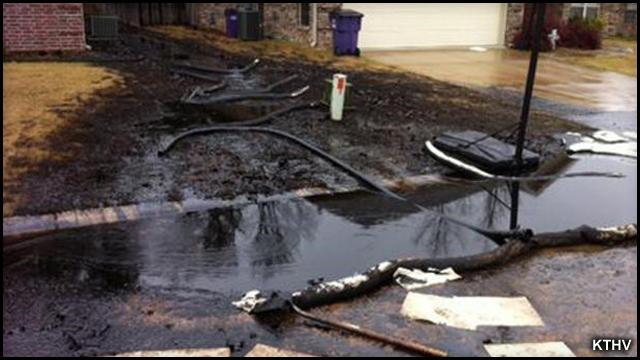ExxonMobil oil spill in Arkansas shatters American dream of families still displaced from new homes – ‘People feel like that dream is shattered due to the uncertainty’
By Maria Gallucci
2 May 2013 (InsideClimate News) – It has been more than a month now, and Amber Bartlett has had enough of hotels and apartments and trailer homes. Of crowded rooms whose thin walls amplify the bickering of her four children. Of piles of toys and clothes overflowing from drawers and suitcases. Of not knowing, day to day, where her life is headed. She wants to be back in her five-bedroom, three-bathroom home at 16 Starlite Road North in Mayflower, Arkansas. Ryan Senia, the Bartletts’ next-door neighbor, is plenty ready to go home, too. For the past month the 29-year-old electrical engineer has been sleeping on a friend’s couch instead of in his bed at 20 Starlite Road North. His power tools and equipment are gathering dust in his garage. His grill sits in his backyard, unused. The Bartletts and Senia are among 21 families who were evacuated from their homes on March 29, after an ExxonMobil pipeline spilled at least 210,000 gallons of heavy Canadian crude oil into their neighborhood. For many of them, buying a home in the six-year-old North Woods subdivision was not only the biggest financial investment of their lives, but an emotional investment as well. North Woods would be a good place to live, they believed, with respected schools, sprawling yards and the convenience of being just a short drive from Little Rock, the state capital. It was a beautiful place, too—about 60 spacious brick houses surrounded by a thick forest of trees and creeks where children could play. “A lot of people were ecstatic” about moving into North Woods, Senia said. “Now, people feel like that dream is shattered due to the uncertainty.” The North Woods families have been thrust into the national debate about the type of crude oil that spilled into their neighborhood—a heavy Canadian oil called diluted bitumen or dilbit—and about the safety of the pipelines that carry the oil. A 2010 pipeline spill that dumped dilbit into Michigan’s Kalamazoo River is still being cleaned up today, almost three years later. Meanwhile, the Obama administration is deciding whether to approve the Keystone XL pipeline, which would carry millions of gallons of dilbit from Alberta, Canada, to the Texas Gulf Coast. Until March 29, Good Friday, the North Woods residents hadn’t been touched by this debate. Neither the Bartletts nor Senia had heard of dilbit or paid much attention to the controversy over the Keystone project. They didn’t even know that an Exxon pipeline lay buried nearby until oil began flowing down their street. She Was Reading a Book When the Phone Rang Mayflower police got the first 911 call at 2:44 p.m. It came from Jennifer Dement of 50 Starlite Road North. “Caller adv that a pipe busted and oil is spilling throughout the neighborhood!!” the 911 entry says. A 22-foot-long section of ExxonMobil’s Pegasus pipeline had split open in front of two houses on Starlite Road North and in the forest behind the street. The 858-mile line carries Canadian dilbit from Illinois to Texas, and some of that oil was now blanketing backyards and spilling into the street, up driveways and around a cul-de-sac. Oil was flowing in the other direction, too—away from the neighborhood and into the tiny streams that feed into a swampy cove of Lake Conway, a popular recreation site about a mile away. Dilbit is composed of a heavy oil known as bitumen that has been diluted with liquid chemicals—which can include benzene—so it can move through pipelines. Once dilbit is released from a pipeline, the chemicals gradually evaporate into the environment. Amber Bartlett had just settled down to read “Crossroads,” a Christian novel about a businessman and his near-death experience. She had driven the 20 miles to Little Rock that morning to speak about her IT job at the University of Arkansas for Medical Sciences with students in the school’s medical records degree program. Her husband, Ches, a real estate appraiser for the state highway department, was still at work, and she was looking forward to a few minutes of peace before the kids got home from school. The phone rang just after 3 p.m. It was Raegen, her 16-year-old daughter, calling from her car. Police had closed off the subdivision and wouldn’t let her through the gated entrance. “There’s an oil spill,” Raegen said. “In our neighborhood.” Bartlett ran to the front door. She saw oil rolling down the street in waves, lapping at the front yard and pouring into a storm drain near her driveway. An acrid stench filled the air. [more]
Arkansas Oil Spill Shatters American Dream of Families Still Displaced From New Homes
